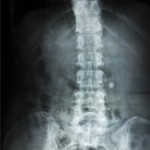Degenerative Disc Disease and What You Can Do About It
Degenerative disc disease involves the deterioration of the cushioning intervertebral discs between individual vertebrae. The medical term for this condition is spondylosis. The intervertebral discs, which provide spinal support and act as shock absorbers, are partially composed of cartilage. As the body ages, water and protein content of cartilage changes, making the disc weaker and more fragile. In addition to changes in the cartilage, the discs themselves are subject to degeneration over time from the normal wear and tear of movement. Other causes of degenerative disc disease include trauma, repetitive stress, and disease.
Degeneration of the disc tissue makes the disc more susceptible to herniation, or rupturing of the disc (called a herniated disc). This can cause pain in the affected area and along the nerves connected to the spinal cord where the degenerative disc is located. The condition progresses from degeneration of the spinal discs to include the spinal joints, called facet joints.
New Treatment Options for Degenerative Disc Disease
Symptoms of degenerative disc disease include pain and restricted range of motion. Degenerative disc disease can affect any part of the spine. Cervical degenerative disc disease refers to degenerative disc disease in the neck. Lumbar degenerative disc disease refers to disc degeneration in the lower back. This is one of the most common causes of lower back pain, which is sometimes referred to as lumbago.
Lumbar disc degeneration most commonly occurs between the ages of 30 and 50. In addition to age, genetics may also play a role in causing degenerative disc disease. You can help prevent this condition by maintaining a healthy weight, proper nutrition, not smoking, and avoiding activities that can result in back and neck injuries. Specific exercises for degenerative disc disease may be all the treatment that is required in mild cases. Other treatment options range from medications to surgery in severe cases. Today minimally invasive alternative treatment options including lumbar disc replacement are available. This is one of the state-of-the-art procedures that brings patients from around the world as well as locally from Maplewood, Westfield, Bernardsville, Morristown, Hackensack and Warren, and throughout Somerset and Essex Counties to New Jersey Spine Specialists.
Our easy-to-reach offices are located in Summit and Montclair, New Jersey. If you suffers from a degenerative disc disease or other spinal problem column and are looking for care from experienced, board certified physicians near you, call or email us today to schedule a thorough consultation with a top spine surgeon in NJ.


 At New Jersey Spine Specialists, we provide a variety of treatments for spine conditions. Our doctors are specially trained in treating all spine conditions with care and precision.
At New Jersey Spine Specialists, we provide a variety of treatments for spine conditions. Our doctors are specially trained in treating all spine conditions with care and precision.





